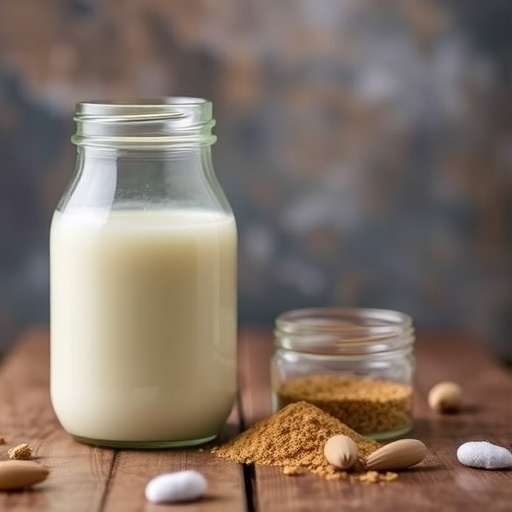In a groundbreaking study, researchers have highlighted a method that might revolutionize the production of fermented milk products by enhancing the viability of specific probiotic strains while simultaneously boosting the production of gamma-aminobutyric acid (GABA). The study centers on the use of fruit juice-coated alginate microencapsulation of Lactiplantibacillus plantarum B7, a strain that has shown promising results in multiple applications due to its beneficial effects on human health. The novel approach involves using natural fruit juices not only for flavor enhancement but also as a protective layer to augment the survival rates of these probiotics during storage.
Probiotics are live microorganisms that, when consumed in adequate amounts, confer health benefits to the host. One of the most well-researched strains is Lactiplantibacillus plantarum, which is renowned for its positive impact on gut health. This strain helps in the modulation of the gut microbiota, enhancing digestion, and potentially alleviating gastrointestinal disorders. However, maintaining the efficacy of probiotics in commercial products remains a significant challenge due to environmental stressors that can diminish their viability.
The innovative technique developed in this study employs alginate, a biodegradable polymer derived from brown seaweed, known for its gel-forming capabilities. The researchers have combined this polymer with the protective qualities of fruit juice to create microencapsulated beads that safeguard the probiotic bacteria from harsh storage conditions. This dual approach not only protects the cells but also opens avenues for flavor diversification and nutritional enhancement in the final fermented product.
The encapsulation method offers a myriad of benefits. It creates a barrier that shields Lactiplantibacillus plantarum B7 from detrimental factors such as pH changes, oxygen exposure, and temperature fluctuations, which are common during storage and transportation of fermented foods. Furthermore, fruit juice coatings can provide antioxidants that bolster cell viability, a significant improvement over non-encapsulated probiotics, which typically have high mortality rates under adverse conditions.
During the experiments, the researchers observed an impressive enhancement in the viability of Lactiplantibacillus plantarum B7 throughout the storage period. While traditional fermented milk products often see a decline in probiotic populations, the microencapsulated version maintained robust cell counts, indicating its potential for commercial use. Additionally, this technique showed a marked increase in GABA production, a compound that has garnered attention for its neuroprotective and anxiety-reducing properties.
GABA is a naturally occurring neurotransmitter that plays a crucial role in regulating brain activity. Elevated levels of GABA are associated with various health benefits, including reduced anxiety, improved sleep, and increased mood stability. This research highlights the potential for enhancing the nutritional profile of fermented dairy products through the strategic cultivation of well-studied probiotic strains capable of producing significant amounts of GABA.
The results of this study have far-reaching implications for both the dairy industry and consumers. For manufacturers, the ability to produce stable, probiotic-rich products with enhanced health benefits opens new markets and consumer bases. For consumers, availing of fermented milk products fortified with both beneficial bacteria and a natural, functional compound like GABA presents a compelling health choice.
Moreover, this research aligns with a growing trend towards functional foods—products that provide health benefits beyond basic nutrition. As consumers become increasingly aware of the importance of gut health and overall well-being, the incorporation of multi-functional probiotics such as Lactiplantibacillus plantarum B7 into popular food items could satisfy demand while improving public health outcomes.
The study’s findings could lead to broader applications in the food industry, beyond mere fermented milk. Enriching a variety of dairy and non-dairy products with encapsulated probiotics could create new possibilities for healthy snacks, beverages, and even supplements. This would not only improve product efficacy but also cater to a range of dietary preferences and restrictions, including vegan-friendly options with plant-based alginate.
This research paves the way for future innovations in food preservation and nutritional enhancement, encouraging further exploration of natural encapsulation methods. By leveraging the properties of fruits and other plant materials, food scientists may discover novel ways to improve health benefits while respecting consumer demand for natural ingredients.
In conclusion, this study spearheaded by Pannerchelvan, Jawlan, and Wasoh marks a significant advancement in the understanding and implementation of probiotics in food technology. By effectively enhancing cell viability and GABA production through an innovative encapsulation strategy, researchers lay the groundwork for developing healthier, more functional fermented products that cater to modern consumer needs. The approach exemplifies the intersection of science and culinary arts, promising to elevate the standards of food quality and health benefits for years to come.
Subject of Research: Enhancing cell viability and GABA production in fermented milk using fruit juice-coated alginate microencapsulated Lactiplantibacillus plantarum B7 during storage.
Article Title: Enhancing cell viability and GABA production in fermented milk using fruit juice-coated alginate microencapsulated Lactiplantibacillus plantarum B7 during storage.
Article References: Pannerchelvan, S., Jawlan, L.L.L., Wasoh, H. et al. Enhancing cell viability and GABA production in fermented milk using fruit juice-coated alginate microencapsulated Lactiplantibacillus plantarum B7 during storage. Int Microbiol (2025). https://doi.org/10.1007/s10123-025-00662-7
Image Credits: AI Generated
DOI: https://doi.org/10.1007/s10123-025-00662-7
Keywords: Lactiplantibacillus plantarum, GABA, probiotics, fermented milk, alginate microencapsulation, fruit juice, gut health, functional foods.




